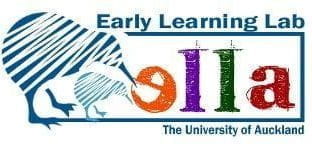Thanks for your interest in taking part in our research!
Below is some information about what to expect when you come for a visit to the Early Learning Lab, University of Auckland.
If you or your child have any further questions about what participation in a study involves, please don’t hesitate to contact us by phone (09 923 4236), email (earlylearning.nz@gmail.com) or Facebook (www.facebook.com/EarlyLearningLab)
We hope to see you and your child soon!
Before your visit
When we schedule your appointment, we will send you an email with the appointment details, including directions to our free carparking. There will also be a photo of the carpark entrance to help you find it. (Follow this link to our parking information)
You are welcome to bring other children (siblings, friends etc) along with you. One of our trained team members will happily play with them and keep them entertained during the session. 😃
When you arrive, one of our team members will meet you at the carpark and give you a parking permit to place on your windshield. We will then walk you up to the child-friendly waiting room in the Science Centre.
Once you’ve arrived at our centre, the main researcher will talk you through the tasks the study will involve and answer any questions you or your child may have. If you are happy to continue with the session, you’ll be asked to sign a form consenting for your child to take part in the study. During this time, your child will be given the opportunity to play with our toys and the researcher to ensure that they are comfortable and ready to participate.
For older children (around 5-years and over) the researcher will also talk them through the kinds of activities the session will involve and ask them whether they would like to take part.
It is important you know that you or your child may stop the session at any time.
During your visit
You will be able to see your child at all times during the session. Depending on the study and the age of the child, you may be asked to hold your child on your lap or sit behind a curtain or in our comfortable waiting room and watch your child live on a closed-circuit monitor.
We’re used to working with children of various ages and different temperaments. If you child is feeling shy, you are welcome to stay in the room with us and we will adjust where you are seated until your child is comfortable!
Our study activities are designed to be fun and engaging. Activities may include playing with toys, engaging in games and game-like activities (such as working together to get a toy out of a puzzle box or playing peek-a-boo), and watching videos or puppet shows. For older children, the researcher may also ask your child questions about their thoughts and opinions.
Parents will be asked to complete a questionnaire about their child’s characteristics and behaviour, and may also be asked to play and interact with their child during the session. If any questions come up during these parent-child interactions or at any point during your session, the researcher will be available to assist you.
Of course, activities differ for each study. Details of the study you are taking part in will be given when we invite you to participate. If you would like more information about what a particular study involves, please contact us.
After your visit
At the end of each session, your child will receive a small gift as a thank you for their participation.
After your session, the researcher will talk with you more about the study and answer any questions from you (or you child). They will then walk you back to your car and collect our parking permit.
Sharing our research findings
Developmental research is long process, and most of our studies take years to complete! When findings from a study you took part in have been written up and published in scientific journals, we will send you a copy of the article if you’ve indicated that you’d like us to do so. In the meantime, we publish a yearly newsletter updating families on studies in progress and our findings so far.
We also attend international conferences, where we share preliminary findings or “bite-sized” projects that are part of an ongoing study. Follow this link to view some of the academic posters we have recently presented.
